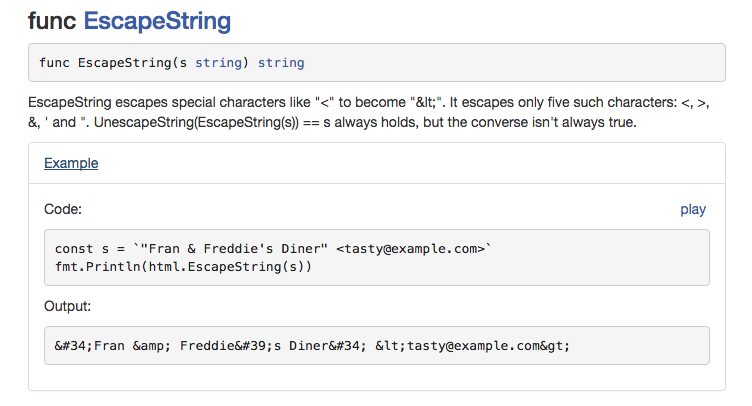A Brief Introduction To Testing In Go
GoMTL-03
August 30, 2016
What's special about testing in Go?
- Testing is first class part of the language
- Testing in Go is coding in Go (no DSL)
- Can be integrated into go doc
- Includes benchmarking support
- Built into standard tooling
Filesystem layout
- Files named
*_test.goare ignored bygo buildandgo install - They're compiled by
go testand some functions are automatically run
Types of test
func Test*(t *testing.T)func Example*()func Benchmark*(t *testing.B)
Normal Test
package sample
import "testing"
func TestSomething(t *testing.T) {
if 1 == 2 {
print("The laws of math are broken!")
t.Fail()
}
}
/* Output:
PASS
ok sample 0.006s
*/
Normal Test (Better)
package sample
import "testing"
func TestSomething(t *testing.T) {
if 2 == 2 {
t.Error("The laws of math are working, but my test is broken!")
}
}
/*
--- FAIL: TestSomething (0.00s)
test_test.go:7: The laws of math are working, but my test is broken!
FAIL
FAIL sample 0.005s
*/
Normal Test (Even Better)
package sample
import "testing"
func TestSomething(t *testing.T) {
if val := SomeFuncInPackage(); val != 67 {
t.Errorf("SomeFuncInPackage: got %v want %v", val, 67)
}
}
/* Output?
--- FAIL: TestSomething (0.00s)
test_test.go:7: SomeFuncInPackage: got 66 want 67
FAIL
FAIL sample 0.006s
*/
Table Driven Test (Bestest)
package sample
import "testing"
func TestAddTwoNumbers(t *testing.T) {
tests := []struct {
Param1 int
Param2 int
Val int
}{
{1, 1, 2},
{2, -1, 1},
{-3, -1, 1}, // Note: this is wrong
}
for _, tc := range tests {
if val := AddTwoNumbers(tc.Param1, tc.Param2); val != tc.Val {
t.Errorf("AddTwoNumbers(%v, %v): got %v want %v", tc.Param1, tc.Param2, val, tc.Val)
}
}
}
/* Output: --- FAIL: TestAddTwoNumbers (0.00s)
foo_test.go:18: AddTwoNumbers(-3, -1): got -4 want 1
FAIL
FAIL sample 0.007s
*/
Example from standard html package

Example Function
package sample
import "fmt"
func Greet(name string) {
fmt.Printf("Hello, %s!\n", name)
}Example Test/Doc (Pass)
package sample
func ExampleGreet() {
Greet("John")
// Output: Hello, John!
}
/* go test output:
ok sample 0.005s
*/
Example Test/Doc (Fail)
package sample
func ExampleGreet() {
Greet("Jean")
// Output: Hello, John!
}
/* go test output:
--- FAIL: ExampleGreet (0.00s)
got:
Hello, Jean!
want:
Hello, John!
FAIL
FAIL sample 0.006s
*/
Example Test/Doc (Unordered)
package sample
import "fmt"
func ExampleGreet() {
Greet("Jean")
Greet("John")
// Unordered output: Hello, John!
// Hello, Jean!
}
/* go test output:
ok sample 0.006s
*/
Benchmarks
func BenchmarkHello(b *testing.B) {
for i := 0; i < b.N; i++ {
fmt.Sprintf("hello")
}
}
/* go test -bench . output:
testing: warning: no tests to run
PASS
BenchmarkHello-4 20000000 85.4 ns/op
ok sample 1.805s
*/
Benchmarks
func BenchmarkHello(b *testing.B) {
for i := 0; i < b.N; i++ {
fmt.Sprintf("hello")
time.Sleep(100*time.Millisecond)
}
}
/* testing: warning: no tests to run
PASS
BenchmarkHello-4 10 102972252 ns/op
ok sample 1.142s
*/
Go 1.7 Subtests/Subbenchmarks
func TestSomething(t *testing.T) {
// You can do some setup that both Name and AnotherName
// might need, such as connecting to a database here.
t.Parallel() // <-- Optional, makes the subtests run
// in parallel
t.Run("Name", func(t *testing.T) { /* ... */ } )
t.Run("AnotherName", func(t *testing.T) { /* ... */ } )
// Do some teardown
// This will run Name and AnotherName in parallel,
// and then block until they finish before running the
// next TestSomethingElse()
}